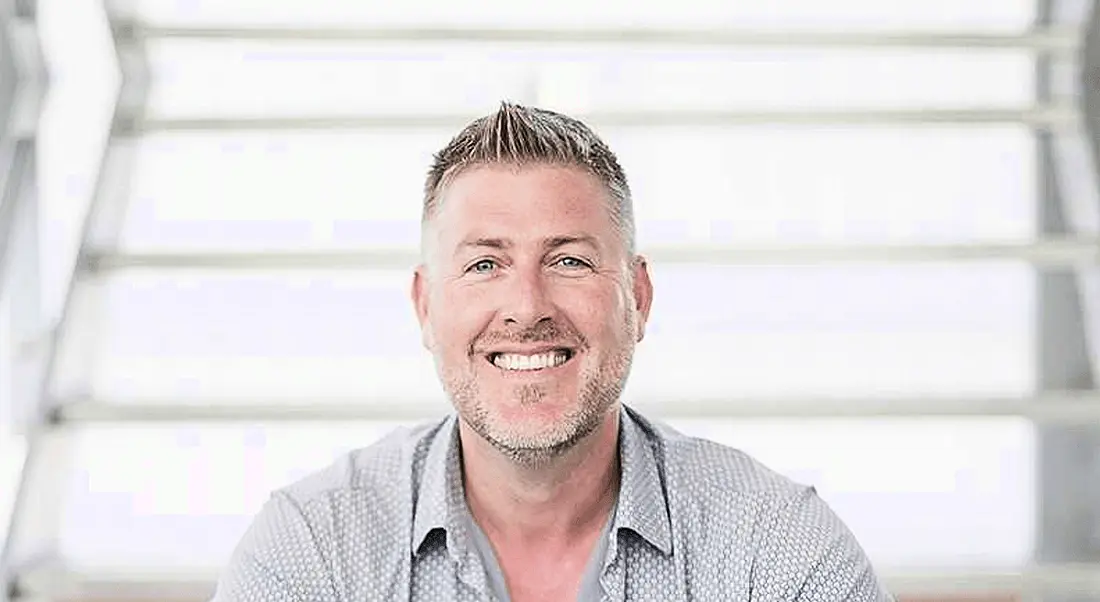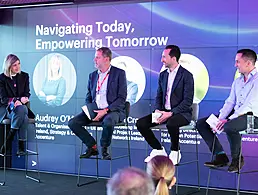The Irish man behind the world’s most influential HR tech conference says the future of work could either be like Star Trek or Mad Max.
HR tech is one of the most crucial and lucrative areas of technology. Entire industries run on it and, aside from the soft-skills aspect of relationships, it is a vital element that bonds individuals with organisations. From the payroll to ERP, time management and resourcing, HR tech is ever present and, as an industry within the world of technology, it is worth billions of dollars.
And yet, you don’t hear the titans of tech at Facebook, Apple, Microsoft, IBM or elsewhere mention it much. It may not sound as sexy as smartphones, but the arteries and sinews of the entire business world are predicated on HR tech.
‘Futurism is very much in my veins’
– MARC COLEMAN
As tech becomes more ingrained in our lives and we pursue the ever-elusive ideal of work-life balance, the contradictions are becoming painfully obvious: we are on a collision course with machines, and the illusion of a war for talent masks a deeper chasm that lies ahead.
Irish man Marc Coleman knows this.
Coleman is one of the most influential people in the HR tech world but few at home in Ireland know who he is.
From his offices in Budapest, Hungary, he oversees a fast-growing tech conference empire centred on the future of work. Coleman’s HR Tech World Congress series take place in Las Vegas (15-16 May 2018) and London (20-21 March 2018), and he is hard at work preparing for the next one in Amsterdam just over a week away (24-25 October). Between them, the events garner an audience of 6,000 movers and shakers in HR tech, and growing.
Keeping it real
A microbiologist by trade, the Carlow IT and NUI Galway graduate has a sensitive take on careers and prospects, having worked in a number of industries before building his own conference.
“Carlow was fantastic for me because it was a very much hands-on education in science that was different from the crowded lecture halls of universities. I was a bit wild in Carlow, but did my growing up in Galway.”
After graduating, he worked in the biotech world but was frustrated by the fact that, as a graduate, he had to endure a kind of apprenticeship on low wages while less-skilled workers could earn more than double the salary by just pulling in overtime.
“Futurism is very much in my veins, if you will. I was willing to give up the ghost on the microbiology theme because it was getting quite academic and the next step was a PhD and I just felt I needed a break. I had two degrees, a diploma and a certificate at that point, and decided to travel the world. GlaxoSmithKline and Schering-Plough made offers but I didn’t want to be a lab slave for a few years on the minimum wage while others were just doing overtime three nights a week and earning more. That reality set me sailing pretty quickly.”
Coleman didn’t so much travel the world; he embraced it.
He joined an events management company in New Zealand and soon found himself working on prestigious sports events such as the America’s Cup. “I wound up in Tokyo working on World Cup football and after that I was working on the world’s first Grand Prix in China.”
Success in the sports management and hospitality business beckoned and by the age of 26, he was in charge of the entire Asia Pacific region. “I never even knew I could sell, let alone excel in that cutthroat environment.”
But again, Coleman was sensitive to the ruthless reality of doing business in Asia. “I found myself doing a lot of shutdowns and turnarounds; opening new offices, closing others. The final straw was in Singapore where I had to let a man go from his job and he had a family with five children to support, and, in places like that, it is devastating. I realised how soulless that business was. It was a bit like the movie Up in the Air.
“I decided I didn’t want to be in the world of performance reviews where, even though you excelled, you were an adult who was pretty much treated like you were back at school, getting marked four out of five or getting a 1pc salary increase. The whole system was disgusting.
“Flicking on the TV and seeing individuals like Sepp Blatter getting away with things was a big wake-up call. That realisation is what pulled me into working on the future of work and jobs.
“The governments don’t know what they are doing, the businesses certainly don’t care and it’s on the person or individual to upskill themselves for what’s coming.
“So, I found myself far from home, in my 20s, doing the job of a 50-year-old with all the responsibilities that entails, and feeling crushed by realising just how cruel the world is. It was a kind of burnout and I decided to make my way back to Europe.”
The digital transformation of work
Marc Coleman and his team. Image: HR Tech World
The point Coleman makes about “what is coming” is quite telling because it is a conundrum that has arrested the thoughts of employers and employees all around the world.
The internet and the cloud have disrupted and transformed the world of work, giving people and companies near superpowers in terms of what they can achieve. It has also led to information overload, a multitude of apps to keep an eye on, and now artificial intelligence (AI) is entering the fray.
On one hand, it sounds frightening and people suspect the machines could take their jobs. On the other hand, these technologies could augment people’s abilities.
In the meantime, across the world, there is a shortage of high-skilled people with technical abilities. As such, as every business becomes a digital business, there is a challenge to not only manage the expectations of workers and ensure they are skilled and trained, but also retain them.
And so, the HR tech world runs the gamut of rewards, retention, skills and training and much, much more. Human resources is more than just payroll.
As such, HR Tech World’s line-up include speakers such as Arianna Huffington of Thrive Global, and attendees are the crème de la crème of the blue-chip world, including Thomson Reuters, Ferrari, BMW, Rolls-Royce, SAP, IBM and many others.
“Right now, 80pc of our customers are pan-European and 20pc would be rest of world. In all, our attendees come from 120 countries and we run three shows. We just finished one in San Francisco and we’ll move that to Las Vegas next year. Our European shows are in London and Amsterdam. In the coming year, we expect the three shows to attract 10,000 decision-makers from enterprise-level companies. Next year, the ambition is to scale to anything between 15,000 and 20,000 delegates across all three shows.”
Coleman is also establishing a new HR tech venture in Amsterdam that he describes as “media-related”.
His insight into HR tech came from his own epiphany about the world of work in Asia. “Everything gets lumped on HR and it made me think about how powerful the world of HR actually is. If you look closely at the big five consultancies, most of the revenues they generate is from consulting around work. If you look at what the HR profession looks after, it includes expectations, benefits, learning, hiring. It’s an industry in its own right.
“But, when it came to technology, HR tech around 2011 was being designed for HR. It wasn’t being designed for the employees.
“And what’s happening now is the entire redesign of HR. You could call it the consumerisation of HR as software and tools are reoriented to help employees get more out of the work situation.
“Not only that, if the tools no longer work, people won’t use them and won’t adopt platforms by force.
“The cloud is the biggest disruption we’ve seen in technology and now we are in the advent of AI, which will be the big scary thing we need to get our heads wrapped around in the next 10 years.
“It’s interesting how companies like Facebook and LinkedIn are informing today’s workers’ expectations. We are consuming these technologies on our phones at home at night or at lunchtime, and, during work hours, people are forced to use technology and processes from 10, 20, even 50 years ago.
“Younger workers are demanding a more liberal approach to prescribing tech. It’s almost political – you have a liberal agenda and a kind of alt-right agenda.”
Is AI a threat?
Coleman isn’t afraid to admit AI is an actual threat to people’s livelihoods. He knows people who are doing ordinary office work, but at the same time have to cooperate with machine-learning AIs that are studying how to do their jobs.
Depending how it goes, the world of work teeters on the edge of a near-perfect Star Trek world where humans and machines complement each other, or a Mad Max dystopian future where humans will fight to survive.
“The world has never seen it and most of society is not prepared for it. I would say that more people in the last six months have become sensitive to this.
“If you look at the Uber model, there’s a whole bunch of drivers saying they are quite happy now because it means they can do their jobs better, faster and for cheaper.
“But things like pensions or the capitalist model; a bank manager is not going to give a loan to a gig economy worker – like an Uber driver – and then there will be the displacement of all these guys when autonomous vehicles become more common. It’s not going to be a nice experience for the taxi drivers if they wake up one day and they realise their jobs are gone.
“The governments are not doing anything about this. Is it fair that all that wealth creation is going back to Silicon Valley?”
Coleman warns that there are machine-learning agents today gathering information on how jobs are being done in accounting and legal roles, and this is resulting in the advent of the robo-adviser, a software creation on the other end of the internet that most users can’t tell is human or machine.
“These jobs are being fed into supercomputers and literally, it is the employee today who is feeding this data. Data is the new oil and these machines are learning how to do these jobs.
“And so, there is the implied threat that these machines could strip away tens of millions of jobs. People are just not ready for this; they are not upskilled, and companies and governments are not going to look after them.
“People themselves need to think what skills they will need five years – or even two years – from now or they could find themselves unemployable.”
One big elephant in the room is the US trucking industry – the biggest employer in the US – which supports an entire ecosystem, including motels, restaurants, car parks and distribution hubs. “If trucks become autonomous vehicles run entirely on green energy, then that is an entire ecosystem gone in a flash.”
Ironically, Coleman said the very authors of the digital future, such as Bill Gates and Elon Musk, have pointed out that some of these technologies will have to be taxed.
“In Sweden, they are pushing for the six-hour or even four-hour workday while in America, the 100-hour week is still a reality. Universal basic income is something that may have to come true.”
Either way, Coleman concluded, a confrontation is coming.
“We could embrace a Star Trek world where people and machines complement each other, or it it could all end up like a Mad Max movie – and we don’t want to go there.”




